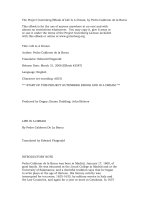A Fatal Homecoming
Bạn đang xem bản rút gọn của tài liệu. Xem và tải ngay bản đầy đủ của tài liệu tại đây (203.63 KB, 18 trang )
A FATAL
HOMECOMING
A Jean Bellimont Mystery
by Trevor Whitton
Copyright 2012 Trevor Whitton
This ebook is licensed for distribution through free-ebooks.net for your personal
enjoyment only and may not be sold or reproduced in any way without the
author's explicit agreement. All other copies offered via other channels are
illegal and a breech of copyright.
Although this book is provided free of charge, if you enjoy it a modest donation
would be appreciated.
Chapter 1
May 1310 - Troyes, Kingdom of France…
Hugo the Forestier shook his head sadly as he inspected yet
another dying tree. It was the fourth he'd found that morning,
to add to the dozens he'd come across over the past month.
What was decimating his forest he couldn't tell. His father
would have known at a glance - but he'd been dead for three
years, now. Hugo had done his best to learn all his secrets
before he died, but found that the old man - although a very
fine forestier - was a very poor teacher.
‘Its something that can't be taught,’ he'd explain
impatiently to his frustrated son. ‘You can only learn the
secrets of the trees by watching and listening to them over
many, many years.’
‘Listen to them? What do you mean, “listen to them”?
Don't talk such rubbish.’ - to which his father would just hang
his head and mutter to himself. Well, Hugo had tried to watch
and listen, but the trees remained stubbornly mute. In his own
way he had nevertheless managed to learn a great deal, and
was now almost as well respected amongst the community as
his father had been. In reality, he was the only person aware
of his shortcomings, but that would quickly change once people
noticed that the forest was dying. He ran his hand over the
rough bark, half hoping it would give him a hint of what was
wrong. ‘“Listen to them!” my father said. Well, if you're ever
going to speak to me, now's the time to do it. No? Then
there's little I can do to help,’ he said aloud. He shook his
head and did one more circuit of the trunk. He could identify
any one of a dozen diseases, but none that remotely resembled
this. In the end, he broke off one of the afflicted branches in
the hope that his friend in Saint Guillaume (a village some
three miles away) could shed some light on the mystery. He
tightened the rope harnessing the load of sticks on his back
before continuing his daily search for kindling and inspection of
traps.
A light rain was falling now, and Hugo pulled the hood of
his tunic over his head to keep out the worst of the damp. It
hung down almost to his nose, restricting his vision to a small
circle just ahead of his feet, but protected his eyes from the
stream of water that was soon cascading over his face. Some
days were better than others for a forestier - but ones like this
came bottom of the pile. He stumbled over tree roots and
more than once grazed his shin against a protruding rock, but
he knew he had to clear the traps today or they'd be cleared by
poachers and foxes tonight. The Commune of Troyes only paid
him to watch and maintain the forest - they wouldn't care if he
went home and dried himself beside his fire. As long as the
trees were kept healthy (God willing, he'll be able to do
something to make sure of that) and a daily load of kindling
was supplied during the colder months to the various charitable
institutions to which the Commune was committed, then no-
one cared what hours he kept. There were no restrictions on
which animals he was allowed to hunt and trap - a great
privilege allowed only to the forestier and the local nobles, and
one on which he greatly depended. There was no alternative
but to plod on despite the rain.
Soon he came to a denser part of the forest and his
progress became more difficult. There was a lot more kindling
to collect here, but tree roots barred the way in every direction
and were treacherously slippery in the damp conditions. It was
curiously quiet - neither bird nor animal stirred and the only
sound came from the branches above as they rocked back and
forth in the wind. He came to a particularly awkward root
buttress and placed his palm against it for balance as he tried
to climb over. Suddenly the moss covering the bark gave way
and the load on his back forced him to lose his balance and
topple sideways. At the last moment he tried to brace himself
with his foot, but by now his momentum was too great. He fell
face first into the mud, bruising his elbow and taking several
layers of skin off his hand into the bargain. He was just
beginning to think the day couldn’t get any worse, when he
lifted his face from the mud and looked directly into the dead,
staring eyes of a corpse.
Suddenly the forest wasn't quiet any more.
Chapter 2.
Richard Beauchamp couldn't understand it. His wife Marguerite
was usually such a gentle, even-tempered woman. He'd never
seen her so much as raise her voice, but for the past few days
she didn't seem to have a civilized word to say to anyone.
She'd yelled at the fruit merchant because the apples weren't
ripe (it was hardly his fault); she'd yelled at her step-son
Etienne for breaking a ceramic plate (it was an old one,
anyway); she'd yelled at Etienne's wife Beatrice for trying to
calm her down; and here she was arguing with Richard himself.
He was a tolerant man and generally didn't hold with husbands
who wouldn't allow dissent from their wives - but he was
nevertheless glad that no one else was around to see her
challenge him in this way.
‘Please remember I am your husband,’ he said as the
argument started to become heated. ‘I trust that I deserve
your respect.’
‘And please remember that Josephine is my daughter. I
have every right to object to would-be suitors.’ For a moment
Richard considered reminding his wife that Beatrice was also
his daughter - albeit stepdaughter - and that (technically,
anyway) it was he who would have the final say over whom
she would wed. He stopped himself just in time, realising that,
although this might be the legal situation, in reality Marguerite
was right.
‘You can’t protect her forever, you know – and she’s
already in her middle twenties. Etienne managed to have
Mathilde wedded just last year, and time is quickly running out
for Josephine.’ Mathilde was Richard’s granddaughter, and his
son and daughter-in-law had had the devil of a time convincing
her to get married. Despite the young woman’s initial
reservations, she was now living happily with her new husband
across town in their own handsome stone house near the
Cathedral.
‘I know how old my daughter is,’ said Marguerite coldly.
Richard decided to try a different tack. He began scratching
absently at the faded upholstery on the arm of his chair and
tried to look nonchalant.
‘I don't see why you still bear a grudge against the
Bellimonts, anyway. Jean's a fine fellow, and his son Claude is
making his way very well in the world. They were once a poor
family, but Jean is Deputy Bailli in all but name these days, and
Claude is a well-regarded and talented apprentice vintner. You
need have no worries about his prospects.’ Marguerite gave
her husband a withering look - one he'd never witnessed from
her before and would never have guessed she possessed. It
was alarming. He thought he knew this woman!
‘That's not what I have against him, as well you know,’
she said - slowly and emphatically. She was standing over him
with her hands on her hips and an unbecoming scowl on her
face. Richard shook his head sadly. The truth was that he had
his own reasons for introspection lately – one recent event in
particularly had given him cause for deep concern. Whatever
transpired, he knew he had to keep the news from his wife at
all costs. He forced his concentration back to the argument at
hand, and tried once again to defend a family he knew to be
good.
‘Surely you can't still hold a grudge against Jean? That
was years ago.’ Marguerite didn't reply, but stood looking at
her husband stony-faced. The room had quickly emptied of its
inhabitants - servants and family alike - once the argument
had started. The couple now had the solar to themselves, a
small fire crackling on the hearth and the rain outside beating
against the shutters. ‘For Saint Peter’s sake,’ said Richard once
he realised he wasn't going to get a response, ‘the poor man
even undertook a pilgrimage to Compostella to atone for the
wrong he did you! What more can he do?’
‘I have no particular argument with Jean Bellimont - but I
do not want his son seeing my daughter. Absolutely not!’ And
with that she suddenly burst into tears and stormed from the
room, slamming the huge oak door behind her so hard that the
whole house seemed to shake. Richard shook his head once
again and chewed on his upper lip contemplatively.
‘There's more to this than meets the eye,’ he said aloud.
‘But for the life of me I don't know what it is.’
Bailli Henri Dubois cocked his head to one side and regarded
his clerk closely. He could tell the man wasn't happy by the
way he avoided his employer's gaze, and Henri wasn't going to
stand for it. His underling had a strong tendency to get above
himself sometimes, and it was a habit he intended to stamp
out. He leant back in his chair, put his feet on the desk, and
clasped his hands behind his head. It was a look he hoped
conveyed both authority and disapproval. The two men
couldn’t have been less alike – Henri was tall and still strikingly
handsome despite his advancing years, and Jean was a good
two heads shorter, bald except for the tufts of hair stretching
from ear to ear around the back of his head, and presenting a
less-than-flattering physique which seemed to grow more
rotund by the day. He was also several years the other man’s
senior, although he looked considerably older.
‘Something wrong, Jean?’ said Henri, a challenging look in
his eye. Jean continued to write without looking up - merely
shrugging his shoulders in reply. It was a mannerism that
irritated his employer - although he could never explain why.
He tried to appear casual, but it was an effort. ‘You disagree
perhaps with my ruling on that possession dispute?’ Another
shrug was enough to tip Henri over the edge. He jumped to
his feet and walked over to his clerk's desk - hands on hips and
legs astride. ‘Well what would you have done?’
‘It was the old man's by right,’ said Jean, still without
looking up.
‘But not by law - there's a difference!’ said Henri,
thumping the table and nearly knocking over a jar of ink. The
little clerk caught it just in time to avert catastrophe, then
finally deigned to look up.
‘Unfortunately you're right. Too often ethical and legal
issues conflict. I'm glad I don't have your job.’ The words
were contrite enough, but they were delivered with just a hint
of insolence. Henri was nonplussed how to respond, and finally
settled for repeating his original question.
‘So what would you have done?’
‘Me? I'd have broken the law,’ said Jean, going back to
his writing. Henri continued to stand over his clerk, still unsure
what to do. This was an ongoing quandary for him – should he
correct his insufferable behaviour or learn from his wisdom?
Was the fellow a fool or a sage? The scene was finally
interrupted by the entry of the huge lieutenant, Francois.
‘What is it?’ snapped Henri.
‘A body, sir. Hugo the Forestier's found a body.’
‘Recognise him?’ asked Henri, looking down at the body on the
table a short time later.
‘Never seen him before,’ said Jean.
‘No doubt what killed him,’ said Henri, pointing to the
deep gash in the man’s head.
‘A sword would you say?’ The Bailli shook his head.
‘No – more like a club. Blunt rather than sharp is my
guess.’ The two men continued to contemplate the scene
before them in silence, until Henri finally clicked his tongue and
turned away.
‘What’s the matter?’ asked Jean, following close behind.
‘This is the part of the job I can’t stand.’ Henri had dealt
with dozens of murders in his time, and Jean wondered why
this case was any different. If it had been a child lying dead
back there or a young woman, he could understand. But why
get so upset over a total stranger? Henri must have sensed his
clerk’s bewilderment. ‘Public display of the body for
identification,’ he explained with distaste. Suddenly Jean
understood. Public displays brought out the worst in everyone.
People who were normally reasonable suddenly flocked to ogle
the corpse. Henri spat on the ground and turned back to look
at the poor wretch stretched out on the slab. ‘No one deserves
such humiliation. Well – some do, I suppose. But it makes me
sick. If I had my way I’d lock up the lot of them. Troyes would
be much the better for it.’ Jean was in complete sympathy.
After another rueful shake of the head, Henri bellowed for
Francois, who appeared so quickly he must have been waiting
outside expecting the summons. ‘Arrange for the Crier de Cite
to announce a public viewing of the body for tomorrow
morning, please,’ said Henri – almost regretfully.
‘Public identification?’ asked Francois. Henri nodded and
shrugged.
‘As soon as possible, please. I want this matter cleared
up before…’
‘Before he starts rotting, sir?’ Henri pulled a face and
nodded again.
‘You have a way with words, lieutenant. No doubt about
that.’
‘No point pissing around, sir,’ said Francois, before turning
on his heel and setting off to get things under way. For a









